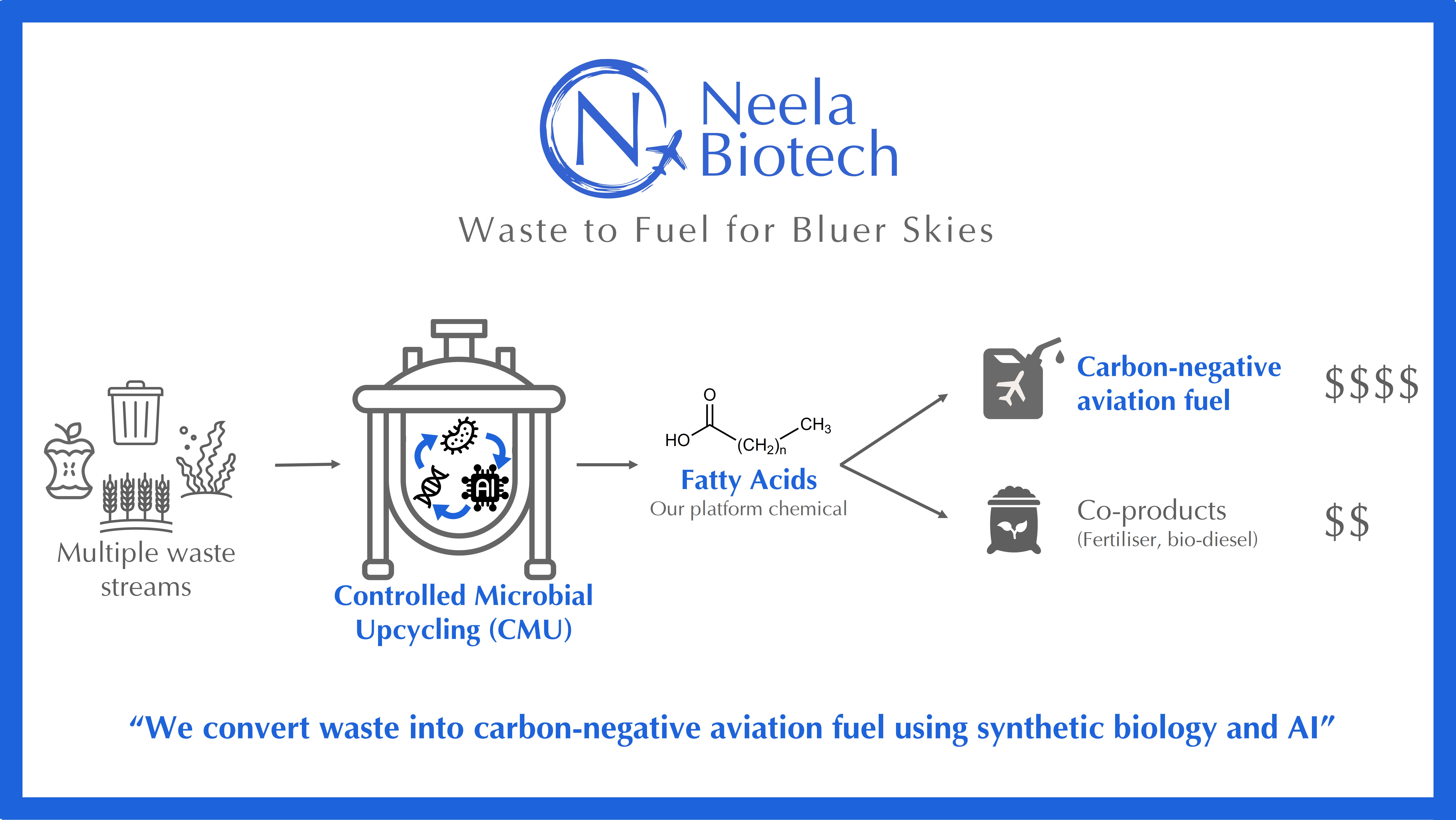
Neela Biotech, a start-up co-founded by early career researchers Dr Deepanshu Singh and Friederike Nintzel, has secured grant funding from the Henry Royce Institute towards a novel method of producing carbon-negative aviation fuel.
Our CMU process tackles barriers by using diverse feedstocks, replacing energy-intensive processes with low-cost microbial action and leveraging existing infrastructure. This makes our pathway highly scalable and cost-effective.
Dr Deepanshu Singh
The start-up is addressing aviation’s emissions challenge using its own nature-inspired anaerobic digestion process called Controlled Microbial Upcycling (CMU), which builds on recent breakthroughs in AI-driven synthetic biology to power the future of flight with carbon-negative fuels.
Their process transforms multiple waste streams into low-cost, drop-in jet fuel by leveraging existing biogas plant and refinery infrastructure. Unlike traditional sustainable aviation fuels (SAF), which often displace food production because respective feedstocks are grown on arable land, CMU eliminates competition for food, land and water whilst reducing production costs.
Now, thanks to grant funding from the Henry Royce Institute, Neela Biotech will collaborate with the Aviation Impact Accelerator (AIA) at the Whittle Laboratory, University of Cambridge, on a five-month long feasibility study of carbon-negative fatty acid production via their novel CMU process. The goal is to bring the technology closer to market, specifically for SAF production. As the academic collaborator, the AIA will be performing technoeconomic and lifecycle emissions assessments of Neela Biotech’s SAF pathway.
This collaboration highlights how the system modelling at the heart of the AIA is not just about informing better policy – it is about guiding smarter investment decisions and helping start-ups focus where they can make the greatest impact. By linking this modelling capability with cutting-edge companies like Neela Biotech, the New Whittle Laboratory and the Bennett Innovation Laboratory at the University of Cambridge are helping to shape and accelerate the industries of the future.

Dr Deepanshu Singh, a researcher in sustainable aviation and Business Development Lead at the AIA, said: “Aviation is the most emissions-intensive mode of transport. SAFs offer a drop-in solution to decarbonise the sector, yet they make up less than 1% jet fuel usage today. Current SAF production pathways face scale-up challenges due to feedstock limitations and reliance on energy- and capex-intensive processes. Our CMU process tackles these barriers by using diverse feedstocks, replacing energy-intensive processes with low-cost microbial action and leveraging existing infrastructure. This makes our pathway highly scalable and cost-effective.”
Friederike Nintzel, final-year Marie Curie PhD fellow in synthetic biology, adds: “Our approach has only recently become feasible due to advances in microbiome engineering and AI-driven bio-process design. Further, the demand for SAFs is rising at an unprecedented rate because of airlines’ net zero targets and global SAF mandates.”
Earlier this year, their innovation was recognised at the 2025 Cambridge Zero Climate Challenge, where Neela Biotech won first prize. And they were selected to join a new incubator programme from King’s Entrepreneurship Lab (King’s E-Lab), delivered in partnership with Founders at the University of Cambridge. SPARK 1.0 is a four-week residential incubator that began in late August 2025, designed to help early-stage ventures grow from research-backed ideas into investable companies.
Neela Biotech is also a part of the prestigious IAG Innovation Accelerator, where they are learning about fuel supply chains, certification, and validating the commercial potential of their SAF pathway. IAG is the parent company of airlines including British Airways, Aer Lingus, Iberia and Vueling.
Neela Biotech has gone on to achieve recent success in two major start-up competitions:
- Becoming a grand finalist in the 12th Lee Kuan Yew Global Business Plan Competition, competing against other next-generation entrepreneurs and leaders in the global innovation ecosystem.
- Selected as a ClimateLaunchpad Regional Champion (Europe), and will now advance to the Global Grand Final in Vienna as a recognised ‘top 8’ start-up from around the world, having competed against more than 2,700 global start-ups.

